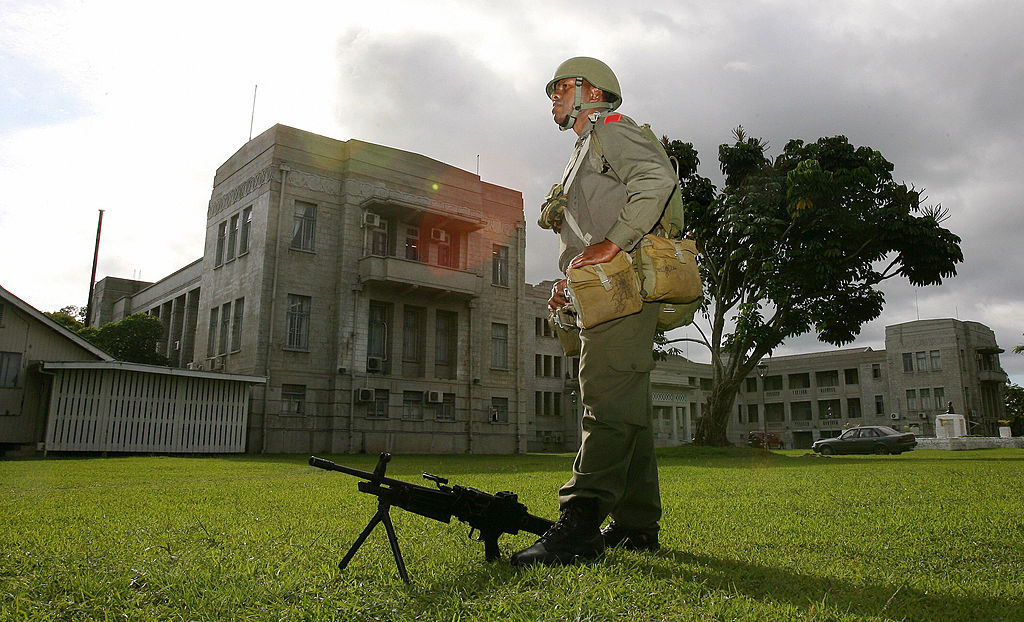
Almost inconceivably, the fact that the parliament of Fiji has been without an opposition for weeks has largely escaped the attention of the international media. Yet all 26 parliamentary members of Frank Bainimarama’s FijiFirst party have been suspended and barred from the chamber—without pay—since mid-May.
Predictably, given how deeply the meme of ‘coup culture’ has penetrated the Fijian psyche, this building political crisis has generated speculation about military intervention.
According to the local rumour mill, the decision to sideline the opposition aims to provide a pretext for the Republic of Fiji Military Forces (RFMF) to intervene using its role as guarantor of the 2013 constitution to return FijiFirst to power.
The logic of this speculation is difficult to follow though, especially as a look at the legalities involved suggests it may instead be a power play by Prime Minister Sitiveni Rabuka’s governing coalition.
The current political drama began on 17 May when the Fijian Elections Office’s acting supervisor of elections, Ana Mataiciwa, decided to suspend the registration of FijiFirst and three other smaller parties until and unless they presented audited financial statements to the acting Registrar of Political Parties, as required by the Political Parties (Registration, Conduct, Funding and Disclosures) Act (PPR Act).
The following day, the speaker of Fiji’s parliament, Ratu Naiqama Lalabalavu, barred the Frank Bainimarama-led FijiFirst Party from parliament. He ruled that all 26 FijiFirst members were not entitled to participate in proceedings as a consequence of their party’s suspended registration.
The idea of an RFMF intervention in this scenario enjoys credence due to a flawed understanding of both Fijian electoral law and the 2013 constitution, but these documents more strongly indicate that the decision is a power grab by the Rabuka Government.
The speaker’s decision to bar the 26 FijiFirst members from the parliament was based on the decision to suspend their party’s registration. However, the PPR Act only specifies that the registrar ‘may’ suspend the registration of a political party prior to full deregistration. So Mataiciwa was not obliged to suspend FijiFirst. She chose to do so. This is in contrast to the mandatory language of the PPR Act regarding deregistration. This states that the registrar ‘shall deregister’ a political party which has not remedied a specified breach of the PPR Act.
A similar question arises regarding the speaker’s decision to suspend FijiFirst’s parliamentary duties and pay. The speaker appears to have interpreted the PPR Act stipulation that a suspended party is ‘not entitled to any of the rights and privileges’ that a registered party enjoys in parliament.
But the PPR Act makes clear later that parliament is a special case. It states that the members of a deregistered political party ‘shall continue to serve for the remainder of their term as independents or as members of other political parties.’
This provision undermines critics who believed that party deregulation would result in the expulsion of the suspended FijiFirst members from the parliament, and that the party would be prevented from filling the resultant casual vacancies. Though it is true that if deregistration caused expulsion, there would no FijiFirst candidates available from the 2022 election to fill casual vacancies. With no FijiFirst candidates available, a national by-election would be required to fill the vacancies.
In this case, opposition critics would note that even if the military did not intervene, Prime Minister Rabuka’s People’s Alliance party would probably win a significant number of additional seats through this by-election, possibly even enough to govern in its own right.
It is questionable just how important a political advantage a by-election might be to Rabuka, even if it were possible. Unlike in Samoa or Solomon Islands, earning a supermajority would not allow constitutional change by the governing party, as Fiji’s constitution requires a vote in favour by three quarters of all registered voters.
Moreover, if the People’s Alliance did achieve a majority after such a by-election, the current tri-partite governing coalition would certainly collapse, creating a whole new set of grounds for political instability in both the parliament and the wider community.
On balance, the rumours regarding such extreme consequences of suspending nearly half of Fiji’s parliament are far-fetched, despite the seriousness of running a parliament without an opposition—especially in the leadup to the budget session.
Undoubtedly, the suspension of the FijiFirst members is a grave matter for the standing of the parliament as the central organ of governance in Fiji. There are also political and legal questions regarding the use of discretionary powers both by the acting supervisor of elections and the speaker.
But in terms of ‘coup culture’ fears, it is important to note that the current controversy would have to escalate to the level of a constitutional crisis to plausibly allow the RFMF to assert its claimed guardianship role over the 2013 constitution. Besides, FijiFirst will probably be able to submit the required financial acquittals in time to avoid deregistration, giving the episode the appearance of a storm in a teacup. Still, the affair will linger in the air, as suspicion and distrust take time to be allayed. In reality, they will just go back into political storage until the country’s next cause celebre.

